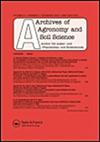Comparative study on changes in biochemical constituents, yield and quality of lemongrass (Cymbopogon flexuosus) grown under different soil types
IF 1.8
4区 农林科学
Q1 AGRONOMY
引用次数: 0
Abstract
ABSTRACT Lemongrass (Cymbopogon flexuosus) is a perennial aromatic grass suitable for cultivation on a wide range of soils. This study aims to evaluate the feasibility of lemongrass for utilizing alkaline lands and to examine the biochemical, yield and quality response of lemongrass cultivars on different soils. In this experiment, soils with different soil texture, i.e. S1- Clay loam soil; S2- Loamy sand soil; S3- Sandy loam soil; S4- Loam soil, were taken from different geographical locations. Physico-chemical properties, initial soil status of selected soil types were tested. Growth parameters, biochemical enzymes, yield and quality parameters of lemongrass varieties were determined. Post-harvest status of soils was also analyzed. Soil calcareousness and other soil characteristics like cation exchange capacity significantly impacted lemongrass varieties on biochemical properties such as proline content, lipid peroxidation, nitrate reductase activity, herb and oil yields, and constituents of essential oil. The herbage and oil yield of lemongrass significantly decreased with an upsurge in soil calcareousness. The total citral content in the essential oil was highest for the variety ‘Krishna’ (85.33%) grown in clay loam soil and lowest in ‘CIM-Shikhar’ variety (65.09%) grown in sandy loam soil. Post-harvest data of soils showed significant impact on soil ameliorating potential of lemongrass.不同土壤类型下柠檬草生化成分、产量和品质变化的比较研究
柠檬草(Cymbopogon flexusus)是一种多年生芳香草,适合在各种土壤中种植。本研究旨在评估柠檬草利用碱土的可行性,并考察不同土壤上柠檬草品种的生化、产量和质量反应。在本试验中,不同土壤质地的土壤,即S1-粘壤土;S2——壤土;S3——沙壤土;S4-壤土,取自不同的地理位置。对所选土壤类型的理化性质、初始土壤状况进行了测试。测定了柠檬草品种的生长参数、生化酶、产量和品质参数。还分析了收获后土壤的状况。土壤石灰性和阳离子交换能力等其他土壤特征显著影响了柠檬草品种的脯氨酸含量、脂质过氧化、硝酸还原酶活性、草本植物和油料产量以及精油成分等生化特性。随着土壤钙度的升高,柠檬草的牧草产量和油产量显著下降。在粘壤土中生长的品种“Krishna”的精油中柠檬醛总含量最高(85.33%),而在沙壤土中种植的品种“CIM Shikhar”的精油总含量最低(65.09%)。采后土壤数据显示,柠檬草对土壤改良潜力有显著影响。
本文章由计算机程序翻译,如有差异,请以英文原文为准。
求助全文
约1分钟内获得全文
求助全文
来源期刊

Archives of Agronomy and Soil Science
AGRONOMY-SOIL SCIENCE
CiteScore
5.50
自引率
4.20%
发文量
107
期刊介绍:
rchives of Agronomy and Soil Science is a well-established journal that has been in publication for over fifty years. The Journal publishes papers over the entire range of agronomy and soil science. Manuscripts involved in developing and testing hypotheses to understand casual relationships in the following areas:
plant nutrition
fertilizers
manure
soil tillage
soil biotechnology and ecophysiology
amelioration
irrigation and drainage
plant production on arable and grass land
agroclimatology
landscape formation and environmental management in rural regions
management of natural and created wetland ecosystems
bio-geochemical processes
soil-plant-microbe interactions and rhizosphere processes
soil morphology, classification, monitoring, heterogeneity and scales
reuse of waste waters and biosolids of agri-industrial origin in soil are especially encouraged.
As well as original contributions, the Journal also publishes current reviews.
 求助内容:
求助内容: 应助结果提醒方式:
应助结果提醒方式:


